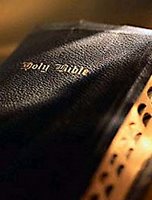Psalm 93: The Sufficiency of God's Word
 posted by paul
posted by paulThe Psalmist has established the reign of the King. The Lord reigns in majesty and strength eternally over all creation. His reign will continue to be threatened until the end of time, but He is too mighty and His throne too high for the waves of the rebellion. This is our King. He is a reliable King in whom we can trust. Because we can trust Him we can also trust His “testimonies.” Commonly God’s precepts are referred to as His testimony (see Psalm 119).
The Psalmist, having already spoken of God’s kingdom, now shows that the laws of that Kingdom are just and true and holy just like the King. If God is the majestic and strong King that we have been talking about then His word, or law, must be equally majestic and strong. Think about it! How else would a king rule besides through his decrees? Is there another way for a king to rule? No, a ruler of any kind has to use words- usually written words to rule. This is why our government has given us laws to follow. The government has established a legal limit for how fast we can drive, but we would not know what that limit was if it were not for signs on the side of the road. In fact, often times when we talk about state and federal officials we refer to them as lawmakers. This is because they govern us through the laws that they have passed. God rules over His creation in a similar way. He has given us “His Law” so that by it we will know the will of the King. The difference between God and human rulers is that God will perfectly enforce His law and He will judge all those who break it. If we want
 to know the will of the King then we must know His law, the Bible. The Bible is completely sufficient to guide conform our lives to the will of the King. We don’t have Senators calling us up individually on the phone to tell us what laws they would like each one of us to follow. There is one set of rules that is passed down through the law of the land. So too God has given us His law. He does not speak to us individually to give us special insight into His will because there is no need for Him to do so.
to know the will of the King then we must know His law, the Bible. The Bible is completely sufficient to guide conform our lives to the will of the King. We don’t have Senators calling us up individually on the phone to tell us what laws they would like each one of us to follow. There is one set of rules that is passed down through the law of the land. So too God has given us His law. He does not speak to us individually to give us special insight into His will because there is no need for Him to do so. How often do we hear in our Christian culture about someone feeling the Spirit leading them to do something without having a clue what it means to be led by the Spirit? The Spirit works in a specific way. To be led by the Spirit is not to be led by your feelings; it is to be led by the Word of God. The Spirit of God works through the Word of God. In John 3 Jesus taught Nicodemus the importance of the Spirit of God in Salvation when He said:
Truly, truly, I say to you, unless one is born again he cannot see the kingdom
of God...” “
…Truly, truly, I say to you, unless one is born of water and
the Spirit he cannot enter into the kingdom of God. “That which is born of the
flesh is flesh, and that which is born of the Spirit is spirit. “Do not be
amazed that I said to you, ‘You must be born again.’ The wind blows where it
wishes and you hear the sound of it, but do not know where it comes from and
where it is going; so is everyone who is born of the Spirit.” (3:3,
5-8)
Before we can even accept the gospel message we first have to be reborn of the Spirit. In 1 Peter 1:23 we get an even clearer picture of what that looks like.
…for you have been born again not of seed which is perishable but imperishable,
that is, through the living and enduring word of God. (1:23)
So it is the Spirit of God, using the Word of God, which brings us unto salvation. The testimonies of God are sufficient for our salvation. Based on these verses can we say that the Spirit leads us? Yes, but we must understand that the Spirit leads us through the ministry of the Word. Being led my the Spirit is not some special feeling that you have in you gut. Being led by the Spirit is having your mind renewed as the Spirit hides the word in our hearts.
What about when someone says, “God spoke to me.” Is that alright? Not, if they are talking about a voice they heard; or an emotional feeling that they had. If they mean that God has spoken to them through His written word, then great! God does not need to give us anything more than we already have. Would God reveal to us a Bible that was not sufficient? If we needed something that was not found in Scripture then why did God leave it out of Scripture? Why didn’t God provide for us what we needed when He gave us the Bible? The point that I am trying to make is that God has given us all that we need in the Bible, and when we add something to that we are taking away from the sufficiency of the Bible. Look at what John wrote about the testimonies of God:
1 John 5:9-12 (NASB95):
If we receive the testimony of men,
the testimony of God is greater; for the testimony of God is this, that He has
testified concerning His Son. The one who believes in the Son of God has the
testimony in himself; the one who does not believe God has made Him a liar,
because he has not believed in the testimony that God has given concerning His
Son. And the testimony is this, that God has given us eternal life, and this
life is in His Son. He who has the Son has the life; he who does not have the
Son of God does not have the life.

The testimony of the King is greater than the testimony of any man because through the testimony of God we have been given eternal life. Look at what king David wrote about the testimonies of God:
Psalm 19:7-8 (NASB95):
The law of the Lord is perfect,
restoring the soul; The testimony of the Lord is sure, making wise the simple.
The precepts of the Lord are right, rejoicing the heart; The commandment of the
Lord is pure, enlightening the eyes.
In this Psalm the words “law,” “testimony,” “precepts,” and “commandment” are all synonymous. They are talking about God’s revealed word, the Bible. At the time this Psalm was written the Bible did not even contain all that it now does. But even then God’s word was perfect. Through the ministry of the Spirit, God’s word restores our souls; makes us wise; causes our hearts to rejoice; and enlightens our eyes to truth.
In Nehemiah 8:1-12 we see just how powerful God’s word is. Here we find all the people of Israel gathered together. They had recently returned from captivity, and had completed the rebuilding of the city walls just a few days earlier. They wanted Ezra to bring the book, and he did not disappoint. He preached the word of God for approximately six hours (vs3), the people mourned and wept over their sins (vs9), and then rejoiced at God’s grace (vs10) all because “they understood the words which had been made known to them (vs12).” These are the words of our King, and they are good.
The entirety of Psalm 119 speaks of God’s Word. We could pick any verse out of the 176 verses to display the sufficiency of God’s Word (Isn’t it telling that the longest chapter in the entire Bible is on the sufficiency of the Bible?). This one in particular is one of my favorites:
Psalm 119:144 (NASB95):
Your testimonies are righteous
forever; Give me understanding that I may live.
God’s testimonies are righteous forever. They are confirmed! All throughout Scripture we find God keeping His promises, and fulfilling prophesy. God’s word has never failed, and because His word is a part of His rule it will never fail.
God’s Word is all that we need. When Christ was being tempted in the wilderness by Satan (Luke 4:1-12) He did not call down His legions to defeat Satan; instead Christ used the word of God. Three times Christ answered Satan with the phrase “it is written.” If Christ, the very King Himself, did “not live on bread alone but on every word that proceeds out of the mouth of God” how much more do we need Scripture.



3 Comments:
JOHN 17 IN RELATION TO JOHN 6?
"anonymous,"
If you will notice I did reply to your previous comment.
There are several things that are troubling me about this comment. One in cp talk you are yelling at me with your caps. Two, you don't seem to want me to know who you are, or even what you are asking. As I said in my last response both of these passages apply to what I would call definite atonement, and these passages as well as this doctrine require more time than I can devote to it at this time. As I said, I would love to do an entire series on these passages in the future when the constraints of the "real world" are not infringing upon the "blog world."
If there is a specific question that you would like to raise on this subject I would love to address it as time permits, however I know that I don't have the time to cover the broad subject. Besides, I get the idea that you know what I might say, and you know how you will respond to me. Maybe we could save some time, and get right to the point.
Paul,
I would love to hear your comments when you have time. I have attached some sections of the Didiche, in it the first centry Christians adressed in it some simple terms a way to live out the Gospel message of John.
A friend
CHAPTER 7
7:1 But concerning baptism, thus baptize ye: having first recited all these precepts, baptize in the name of the Father, and of the Son, and of the Holy Spirit, in running water;
7:2 but if thou hast not running water, baptize in some other water, and if thou canst not baptize in cold, in warm water;
7:3 but if thou hast neither, pour water three times on the head, in the name of the Father, and of the Son, and of the Holy Spirit.
7:4 But before the baptism, let him who baptizeth and him who is baptized fast previously, and any others who may be able. And thou shalt command him who is baptized to fast one or two days before.
CHAPTER 9
9:1 But concerning the Eucharist, after this fashion give ye thanks.
9:2 First, concerning the cup. We thank thee, our Father, for the holy vine, David thy Son, which thou hast made known unto us through Jesus Christ thy Son; to thee be the glory for ever.
9:3 And concerning the broken bread. We thank thee, our Father, for the life and knowledge which thou hast made known unto us through Jesus thy Son; to thee be the glory for ever.
9:4 As this broken bread was once scattered on the mountains, and after it had been brought together became one, so may thy Church be gathered together from the ends of the earth unto thy kingdom; for thine is the glory, and the power, through Jesus Christ, for ever.
9:5 And let none eat or drink of your Eucharist but such as have been baptized into the name of the Lord, for of a truth the Lord hath said concerning this, Give not that which is holy unto dogs.
Post a Comment
<< Home